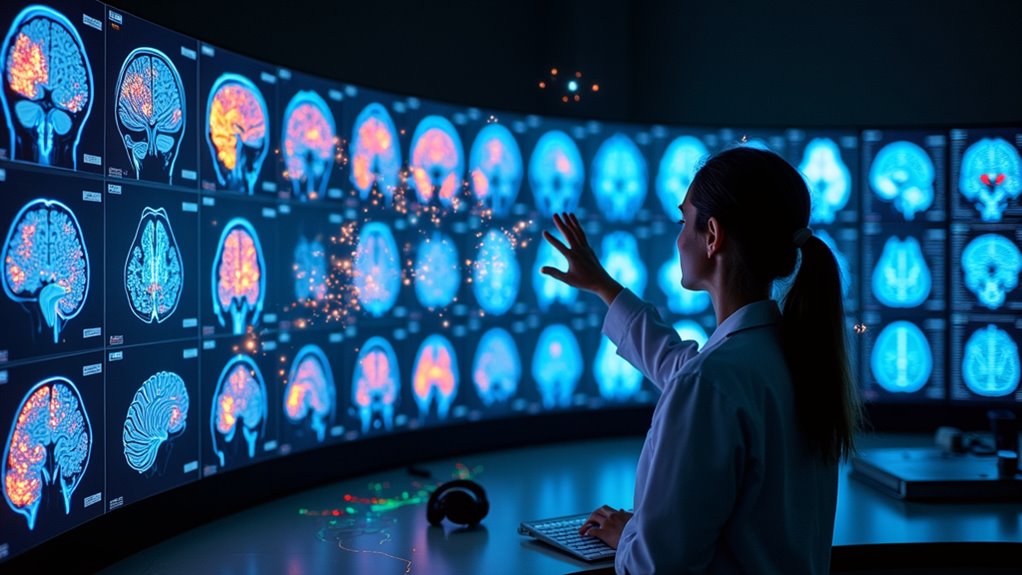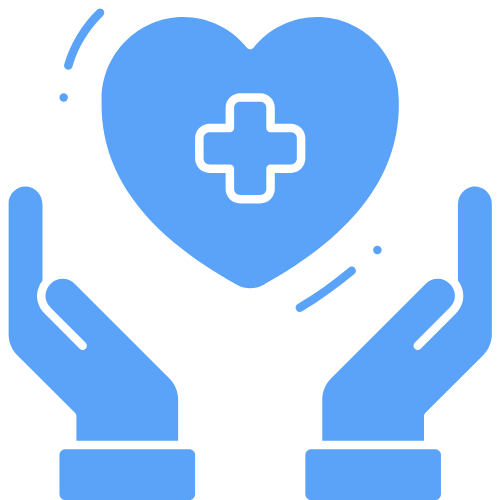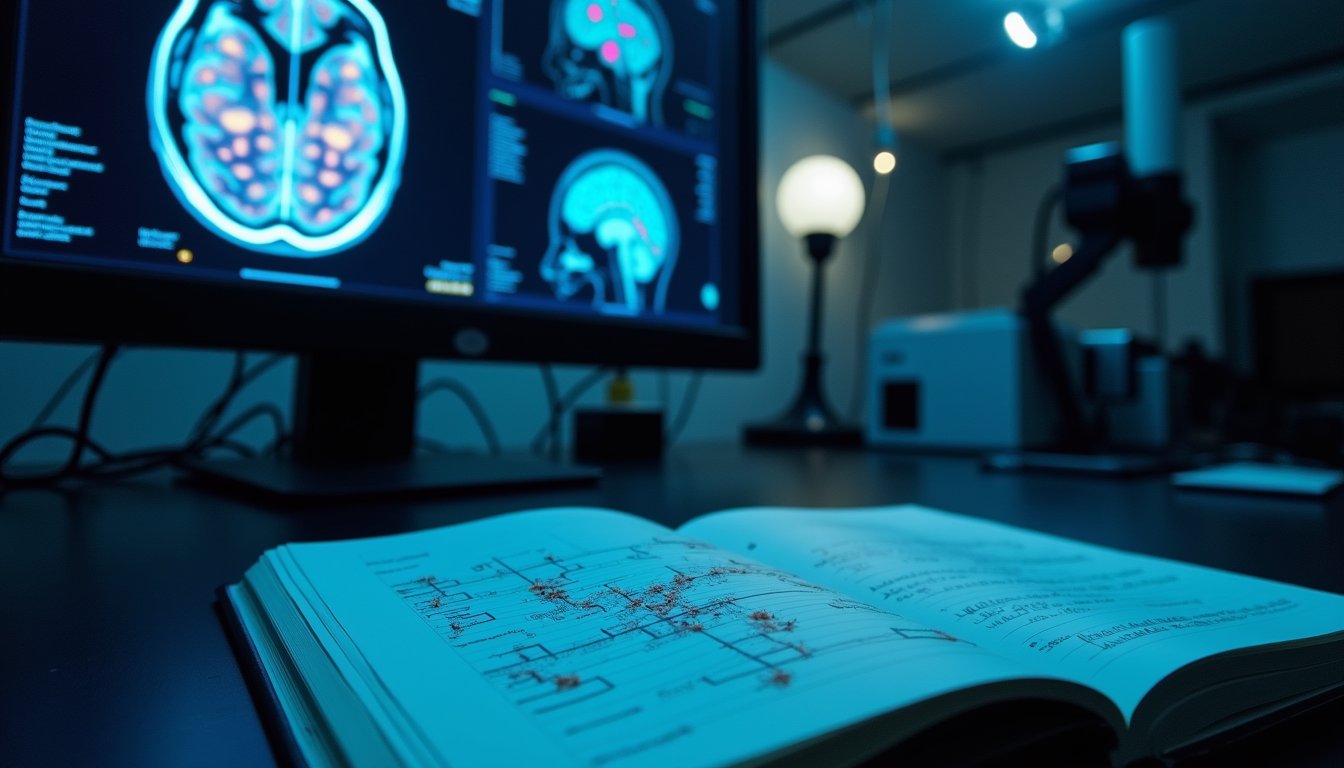Recent scientific breakthroughs have revolutionized mental wellness care through five key advances. You’ll find standardized assessment tools achieving precise outcome measurements, while sleep research reveals critical memory formation mechanisms during deep and REM cycles. AI-powered detection systems now identify mental health risks with 84% accuracy, and genetic insights have mapped 36 key genes for bipolar treatment. Data-driven depression solutions employ predictive modeling at 78% accuracy. These innovations mark the beginning of a transformative phase in mental healthcare.
Pioneering Outcome Metrics for Mental Health Care

Three key developments are revolutionizing mental health outcome metrics: standardized assessment tools, measurement-based care frameworks, and data-driven quality improvement systems. You’ll find diagnosis-specific instruments like PHQ-9 and GAD-7 enabling patient-centered assessments, while multi-diagnostic tools assess broader mental health domains. NIH supports developing outcome-focused measures to better evaluate mental health treatments. The Experience of Care survey provides comprehensive behavioral health assessments for both adults and children.
The advancement of real-time symptom tracking through dynamic measures allows you to monitor treatment effectiveness and make timely adjustments. The Joint Commission requires accredited organizations to use standardized tools for monitoring individual progress. Though MBC adoption remains under 20%, it’s transforming care delivery by integrating baseline assessments with regular progress monitoring. AHRQ’s extensive database of 300+ quality metrics supports systematic evaluation, while automated systems streamline data collection and analysis. These innovations facilitate evidence-based decision-making and help you identify service gaps promptly, culminating in improving treatment outcomes through data-informed care strategies.
Sleep-Based Memory Formation Discoveries
Recent findings in sleep-based memory formation reveal intricate mechanisms through which your brain processes and stores information during different sleep phases. Your memory consolidation relies on complex interactions between deep sleep‘s slow waves and REM sleep architecture, enabling subconscious learning processes even while you’re unconscious. Research shows that synaptic connections are most enhanced immediately after voltage shifts from low to high during slow-wave sleep. Studies indicate that trough-targeting words during slow wave sleep leads to significantly better memory retrieval compared to peak-targeting.
- Deep sleep generates synchronized electrical waves that transfer memories from short-term hippocampal storage to long-term cortical regions
- Calcium signaling, triggered by sleep spindles, strengthens synaptic connections in your cortical neurons
- Your brain’s REM sleep recalibrates neural networks, preventing synaptic saturation and optimizing memory retention
- Specific proteins like Cacna2d1 regulate memory transfer between brain regions through selective downregulation
This orchestrated process guarantees your memories become permanently embedded in cortical structures, maintaining accessibility even without regular retrieval. The body’s glymphatic system efficiency improves significantly when sleeping in lateral or supine positions, facilitating optimal waste clearance from the brain.
AI-Powered Mental Health Risk Detection

While traditional mental health screening methods rely heavily on clinical observation, artificial intelligence is revolutionizing risk detection through sophisticated predictive analytics. You’ll find AI models can now forecast serious mental health issues up to a year in advance, with sleep disturbances emerging as stronger predictors than trauma or family history. Duke Health researchers demonstrated an impressive 84% accuracy rate in identifying patients whose conditions would escalate within the following year. The integration of these tools in primary care settings offers low-cost, scalable screening solutions that don’t require expensive neuroimaging. However, you should consider the ethical implications, including potential stigma reinforcement and response reliability concerns in AI systems. Leading institutions are addressing these challenges through initiatives like Stanford’s responsible AI development program. Modern AI platforms like Clare&me provide 24/7 support through specialized chatbots designed for mental health assistance. Recent advancements in natural language processing have enabled AI to detect signs of depression and anxiety with 90% accuracy through text and speech analysis. By 2025, you’ll see expanded implementation of AI-driven mental wellness monitoring, particularly in population-level screening programs that prioritize accessibility and early intervention.
Genetic Insights Into Bipolar Treatment
Beyond AI-driven screening advances, groundbreaking genetic research has transformed our understanding of bipolar disorder treatment. Scientists have uncovered 36 key genes and nearly 300 genomic regions associated with bipolar disorder, revolutionizing pharmacogenomic prescribing guidelines and medication adherence profiles. The research was made possible through global collaboration of over 800 researchers from the Psychiatric Genomics Consortium.
A comprehensive study comparing 14,000 bipolar patients to an equal number of healthy controls has provided unprecedented insights into the genetic basis of the disorder. The condition affects an estimated 40 million individuals worldwide, making it a significant global health concern.
Key genetic revelations are reshaping treatment approaches:
- The AKAP11 gene identification provides critical insights for developing targeted medications and understanding treatment resistance
- Multi-ancestry analyses across 2.9M participants reveal subtype-specific genetic patterns, enabling more precise therapeutic interventions
- Identification of arteriosclerosis-related genes like CX3CR1 and ST6GAL1 opens new pathways for biomarker-based treatment monitoring
- Shared genetic architecture with schizophrenia and depression suggests opportunities for cross-disorder therapeutic strategies
These advances are accelerating the development of personalized treatment protocols based on individual genetic profiles.
Data-Driven Depression Care Solutions

Transformative data analytics are revolutionizing depression care through sophisticated predictive modeling and personalized treatment protocols. You’ll find AI algorithms achieving 78% accuracy in treatment predictions by integrating clinical, genetic, and neuroimaging data. CYP2D6 genetic testing enables personalized pharmacogenomic guidance, optimizing medication dosing from the outset. With female prevalence higher, research indicates women require enhanced screening protocols and specialized interventions. Event-related potentials provide reliable biomarkers for measuring brain responses to emotional content and decision-making processes. Recent studies demonstrate that dorsal anterior cingulate connectivity patterns significantly improve antidepressant response predictions.
| Data Source | Clinical Impact | Implementation |
|---|---|---|
| Brain Biomarkers | Response Prediction | EMBARC/CANBIND-1 Trials |
| Genetic Testing | Metabolism Profiling | CYP2D6 Analysis |
| AI Integration | Treatment Optimization | 78% Prediction Accuracy |
Despite these advances, socioeconomic treatment barriers persist, with significant disparities in care access. By combining precision psychiatry frameworks with integrated data analysis, you’re able to receive more targeted interventions, potentially reducing the duration of ineffective therapies and improving treatment outcomes.
Frequently Asked Questions
How Do Cultural Differences Affect the Success of Integrated Mental Health Treatments?
Your cultural attitudes toward mental illness markedly impact treatment success. When you’re from a background that stigmatizes mental health care, you’re less likely to engage fully in integrated treatments. You’ll face barriers like conflicting beliefs about illness causes, communication challenges with providers, and resistance to Western therapeutic approaches. Societal stigma surrounding treatment can lead you to delay seeking help or abandon treatment prematurely, decreasing overall effectiveness.
What Role Does Diet and Nutrition Play in Memory Formation?
Your brain’s ability to form and consolidate memories heavily depends on balanced nutrition. When you consume a diet rich in omega-3 fatty acids, antioxidants, and essential nutrients, you’re supporting ideal memory consolidation. Foods like fatty fish, berries, and leafy greens provide vital compounds that protect neurons and boost synaptic connections. Additionally, you’ll benefit from avoiding trans fats and processed foods, which can impair memory function through increased inflammation.
Can Mental Health Wearables Increase Anxiety in Overly Health-Conscious Individuals?
Yes, if you’re overly health-conscious, mental health wearables can heighten your anxiety through biased data interpretation and constant self-monitoring. You’re more likely to obsess over minor health fluctuations and develop maladaptive checking behaviors. Perceived privacy concerns about your sensitive health data can further amplify stress. Your heightened awareness may lead to compulsive device monitoring, disrupting daily activities and potentially creating a self-reinforcing cycle of health-related anxiety.
How Does Childhood Trauma Influence Genetic Expression in Bipolar Disorder?
When you experience childhood trauma, it can considerably alter your genetic expression through epigenetic factors, particularly affecting how your bipolar-related genes function. Your early environmental influences can modify DNA methylation patterns, especially in genes like KITLG, which regulates stress responses. You’ll typically show disrupted methylation adaptations, unlike non-bipolar individuals who develop protective methylation patterns. This interaction between trauma and genetics often leads to earlier onset and more severe bipolar symptoms.
What Percentage of Patients Resist Data-Driven Mental Health Treatment Recommendations?
Based on medication adherence data, you’ll find that approximately 50-60% of patients show resistance to data-driven mental health treatment recommendations. This patient hesitation manifests through either completely discontinuing prescribed treatments or modifying dosages without clinical guidance within the initial year. Treatment adherence challenges are compounded when you consider that 75% of patients misunderstand medication instructions, and stigma around mental health interventions further increases resistance to evidence-based recommendations.
















